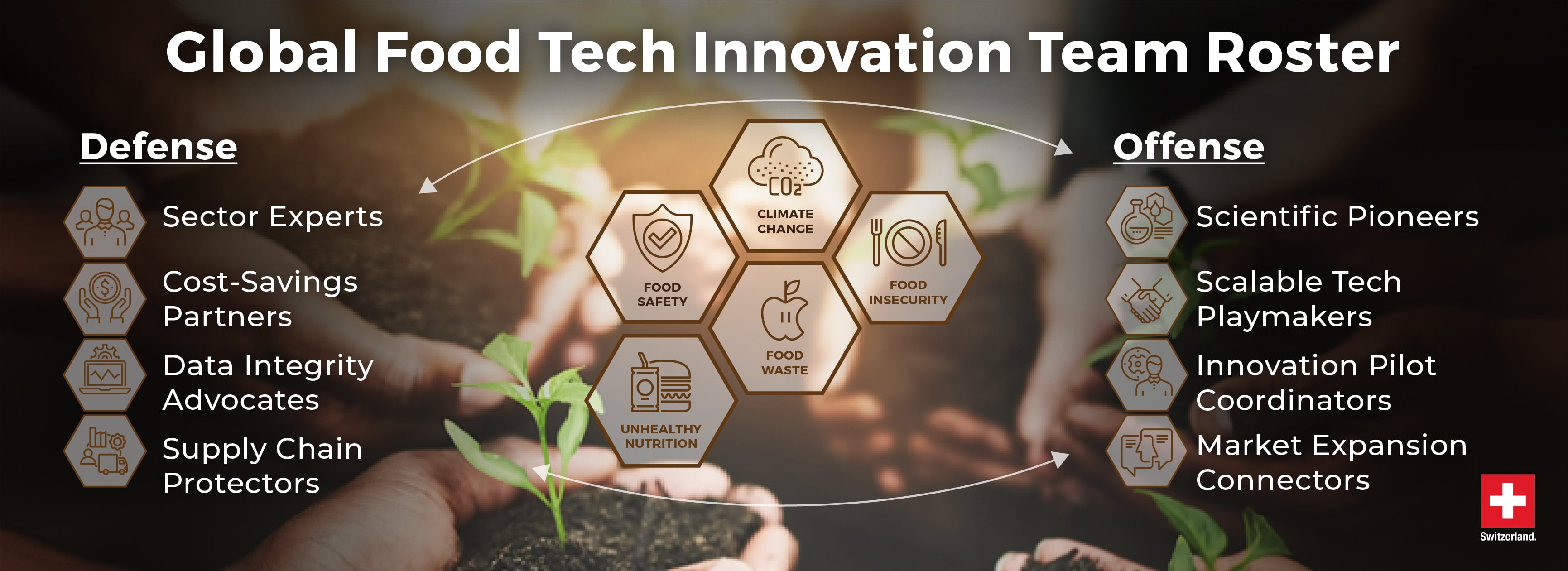Heading into the game of food and agtech innovation, many leaders may feel like they’re on the sidelines, unsure where to start, who to pass to, or how to set up the field for victory.
Like a winning sports team, transforming the global food system requires assembling the right players and ensuring a cohesive ecosystem for success.
The stakes are high – unhealthy nutrition drives preventable diseases like heart disease, stroke, and diabetes, costing an estimated $8 trillion in hidden costs annually, according to the FAO.¹ Achieving change requires collaboration across countries and sectors – agriculture, policy, research, and industry. Food and ag leaders need to bring together startups, researchers, and industry giants to form a championship squad capable of making sustainable change.
The key question is: how do you assemble that winning global team to innovate and succeed? Success depends on finding the right partners and environment, especially when tackling complex areas like AI, alternative proteins, food safety, food waste, and supply chain innovation.
Christoph Besmer, US Trade Commissioner for Switzerland and his team at Business Location Switzerland, excel at this challenge. Switzerland may be small, but it’s mighty in innovation – offering top talent, cutting-edge R&D, academic institutions, and a vibrant, business-friendly ecosystem. The team helps US businesses leverage these assets to innovate, grow, and expand globally.
By connecting businesses with the right players across the country, Business Location Switzerland guides them through the regulatory landscape and provides ongoing support to keep their teams prepared to win.
Building connections with talent, partners, and ecosystems, Switzerland can serve as a proven environment for US companies seeking to innovate and expand their reach worldwide.
From alternative proteins and food waste reduction to AI, food safety, and beyond, the global food system faces multiple complex challenges that demand a strategic game plan. Think of it as a team sport – each challenge is a different opponent, requiring a tailored approach.
To succeed, you need a solid defense to protect your base and a powerful offense to seize new opportunities and push ahead. So, what does that look like? To build a winning squad, there are a few essential steps to consider.
Defense: Establishing a resilient foundation
Your defense is about establishing a resilient foundation – supporting large-scale testing within trusted infrastructure, developing scalable pilot projects with local partners, and ensuring regulatory standards and data validation are in place. This protection prevents setbacks and keeps your team resilient against disruptions like supply chain issues, regulatory hurdles, or environmental risks.
How to build a strong defense in food tech innovation:
- Identify sector experts To support large-scale testing. For example, Ecorobotix uses an AI-powered machine ARA to precisely target weeds, reducing herbicide use by up to 95% – good for the environment, the consumer, and a company’s bottom line.
- Partner with innovators To tackle challenges that deliver cost savings and drive better outcomes. Examples include GoNina, which uses AI to predict demand in food businesses such as bakeries, and Food2050 whose software empowers food service businesses to achieve sustainability and health goals by optimizing efficiency across planning, communication, and monitoring of food offers.
- Draw on trusted data To ensure that consumers can buy your products with confidence – examples include Haelixa, which offers a DNA-based traceability solution to verify the origins of raw materials.
- Collaborate with companies To streamline supply chains and increase transparency – like OneAgrix, a patent-pending agentic AI-powered trade ecosystem driving visibility and trust across the global $3 trillion faith-based food and FMCG trade.
Offense: Expanding capabilities
Your offense is about actively expanding your capabilities – partnering with startups and research institutions to accelerate innovation, leveraging business networks to enter new markets, and deploying advanced technologies for increased yields and sustainability.
How to build a strong offense in food tech innovation:
- Draw on advanced scientific findings To develop new innovations – Cosaic creates clean-label ingredients that enhance both taste and performance in dairy alternatives, using a unique fermentation and extraction technology.
- Use partnerships and scalable technologies To bring new choices to market quickly – like Planted, which creates clean-label meat from plants using innovative food structuring technologies, and Planetary, which out-licenses its technology and recently collaborated with ALDI Suisse to launch a product nationwide based on its B2B mycoprotein ingredient.
- Leverage shared pilot facilities and tailored expertise To bring innovation to market faster, such as The Cultured Hub and FoodYoung. The Cultured Hub offers state-of-the-art facilities as a service for startups developing cultured food innovations to save time and money to pilot and commercialize products. FoodYoung is a full-stack innovation lab that brings together formulation, pilot production, and scale-up, turning bold food ideas into market-ready products.
- Connect into business networks and pilot programs To drive expansion into new regions – like Primal Bee whose innovative thermodynamic beehive is now being used in nine countries around the world.

Whether you’re an established company or a startup, success in global food tech innovation hinges on building the right team around these strategic areas. By applying the proven learnings from Switzerland – leveraging access to top talent, a thriving innovation ecosystem, and a business-friendly regulatory environment – you can create a strong defense and offense that drive innovation and facilitate seamless global expansion.
Author: Christoph Besmer, US Trade Commissioner for Switzerland
References
- Food and Agriculture Organization of the Untied Nations. Unhealthy dietary patterns drive $8 trillion in annual hidden costs of global agrifood systems.


